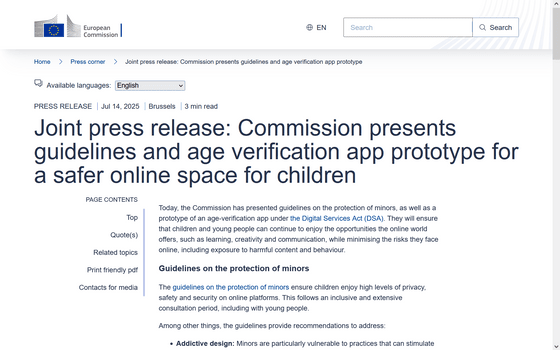EU launches prototype age verification app to protect children online, testing begins in France, Spain, Italy, Denmark and Greece

Under
Joint press release: Commission presents guidelines and age verification app prototype
https://ec.europa.eu/commission/presscorner/detail/en/ip_25_1820

Commission makes available an age-verification blueprint | Shaping Europe's digital future
Commission publishes guidelines on the protection of minors | Shaping Europe's digital future
https://digital-strategy.ec.europa.eu/en/library/commission-publishes-guidelines-protection-minors
The age verification app will be built using the same technology as the digital identity wallet (eID) that is scheduled to be introduced by the end of 2026, and will be used to verify whether users are over 18 years old.
The app verifies the user's age by checking data from a personal authentication agency, and only provides the online service with information verifying that the user is over 18 years old; no other personal information is sent.

Some user testing has already begun since the end of June 2025, and full-scale testing will begin in five countries: Denmark, Greece, Spain, France, and Italy. Countries that introduce the app can choose to integrate the app into their government agency's app or distribute it as an independent app. It is also possible for non-government citizens to build their own apps by referencing the app's solutions.
The EU's age verification solution can technically be used for other purposes, such as verifying age when purchasing alcohol, and will reportedly integrate

In addition, the EC has developed and published guidelines on the protection of minors, which recommend compliance with the following:
Addictive Design
Minors are particularly vulnerable to content that stimulates addictive behavior, so we suggest reducing minors' exposure to addictive content and disabling features that encourage excessive use of online services (such as 'repeat' messages and 'read notifications')
◆Online bullying
We encourage minors to be given the ability to block or mute users and prevent them from being added to groups without their explicit consent, as well as to prohibit them from downloading content posted by minors and preventing them from taking screenshots of such content to prevent the unwanted spread of sexual or personal material.
Harmful Content
Some 'recommendation' algorithms may expose children to harmful situations. We require platforms to moderate recommendations in a way that prioritizes explicit user feedback and does not rely on user behavior. If a minor indicates that they do not want to see certain content, it should not be recommended to them again.
◆Unwanted contact from strangers
We recommend that minors' accounts be set to private by default to minimise the risk of them being contacted by strangers online.
Based on these measures, the EC has said it will strengthen child protection.
Related Posts:
in Posted by log1p_kr







